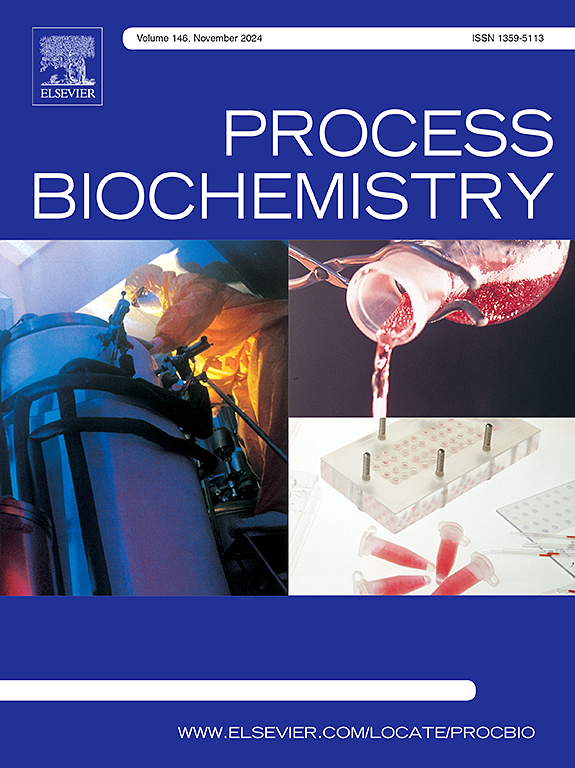Production of environmentally friendly plasticizers derived from soybean oils using biochemical (lipases) and chemical catalysts – Performance in flexible PVC films
IF 3.7
3区 生物学
Q2 BIOCHEMISTRY & MOLECULAR BIOLOGY
引用次数: 0
Abstract
A new and sustainable approach to produce biobased plasticizers from renewable raw materials such as refined soybean oil (RSBO) and used soybean cooking oil (USCO) for flexible PVC film applications has been demonstrated. Decyl esters have been produced via a two-step enzymatic process (hydroesterification), which involves the complete conversion of these oils into free fatty acids (FFAs) via hydrolysis, followed by the esterification of the resulting FFAs with decanol in solvent-free systems. A third step has been utilized to incorporate epoxy groups via an in situ epoxidation process. The properties of PVC films containing these biobased decyl esters were investigated and compared with those of plasticized film using petroleum-derived dioctyl phthalate (DOP) and pure PVC films. The introduction of polar groups (ester and/or epoxy) into the plasticizer structures, confirmed via standard methods and NMR analysis, enhances their interaction and dispersion within the PVC network. The incorporation of these biobased plasticizers, particularly the epoxidized decyl esters derived from waste oil (EDE-USCO), provided the PVC films with improved thermal, mechanical, optical, and migration stability properties relative to those prepared with DOP. The potential of these biobased plasticizers, especially EDE-USCO, for producing flexible PVC films with favorable properties has been established.
使用生化(脂肪酶)和化学催化剂从大豆油中提取的环保型增塑剂的生产。柔性PVC薄膜的性能
一种新的和可持续的方法来生产生物基增塑剂的可再生原料,如精制大豆油(RSBO)和用过的大豆油(USCO)柔性PVC薄膜应用已经被证明。癸酯是通过两步酶促过程(氢酯化)生产的,其中包括通过水解将这些油完全转化为游离脂肪酸(FFAs),然后在无溶剂体系中将所得FFAs与癸醇酯化。第三步已被用于通过原位环氧化工艺纳入环氧基团。研究了含有这些生物基癸酯的PVC膜的性能,并与石油衍生的邻苯二甲酸二辛酯(DOP)增塑膜和纯PVC膜的性能进行了比较。通过标准方法和核磁共振分析证实,在增塑剂结构中引入极性基团(酯和/或环氧)增强了它们在PVC网络中的相互作用和分散。这些生物基增塑剂的掺入,特别是从废油中提取的环氧化癸酯(ed - usco),使PVC膜的热、机械、光学和迁移稳定性优于用DOP制备的膜。这些生物基增塑剂,特别是ed - usco,在生产具有良好性能的柔性PVC薄膜方面的潜力已经确立。
本文章由计算机程序翻译,如有差异,请以英文原文为准。
求助全文
约1分钟内获得全文
求助全文
来源期刊

Process Biochemistry
生物-工程:化工
CiteScore
8.30
自引率
4.50%
发文量
374
审稿时长
53 days
期刊介绍:
Process Biochemistry is an application-orientated research journal devoted to reporting advances with originality and novelty, in the science and technology of the processes involving bioactive molecules and living organisms. These processes concern the production of useful metabolites or materials, or the removal of toxic compounds using tools and methods of current biology and engineering. Its main areas of interest include novel bioprocesses and enabling technologies (such as nanobiotechnology, tissue engineering, directed evolution, metabolic engineering, systems biology, and synthetic biology) applicable in food (nutraceutical), healthcare (medical, pharmaceutical, cosmetic), energy (biofuels), environmental, and biorefinery industries and their underlying biological and engineering principles.
 求助内容:
求助内容: 应助结果提醒方式:
应助结果提醒方式:


